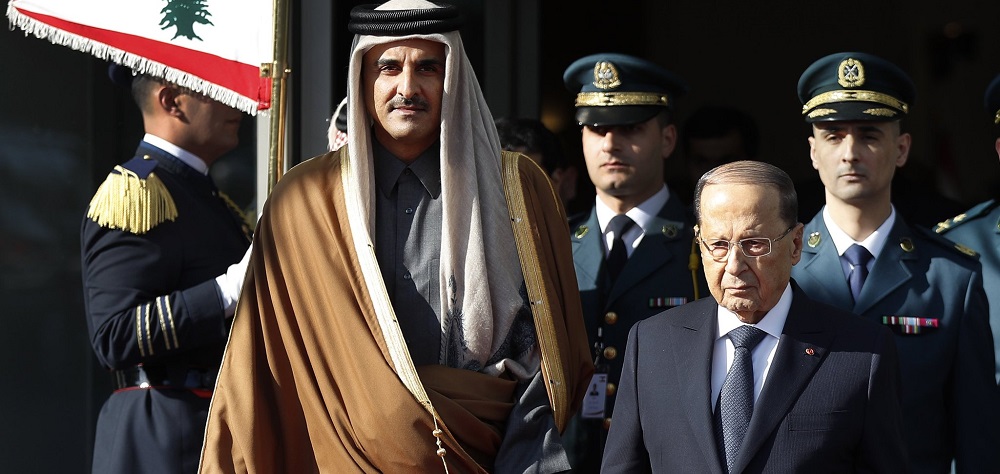Alwaght- In a phone conversation on Sunday, Lebanese President Michael Aoun invited the Qatari Emir Sheikh Tamim bin Hamad Al Thani for a visit to Lebanon. Beirut and Doha, which over the past two years have been under the Arab countries’ pressures in some way, find the expansion of bilateral ties an appropriate factor helping them effectively counter the pressures.
Beirut-Doha relations
Lebanon reminds Qatar help when it looks back to 2008, the year the country sank in critical conditions and unrest engulfed it for 18 months. The country teetered on the brink of a full-scale civil war before the then Qatari Emir Sheikh Hamad bin Khalifa Al Thani played a key role in the country’s exit from the crisis. The Qatari leader invited the heads of all of the Lebanese political parties to gather in Doha and negotiate to move out of the political impasse and form a national coalition government. He also used his credit and influence in the Arab League to invite representatives from the Arab bloc to attend the Doha meeting, opening a new chapter in Lebanese politics. The meeting ended in an agreement. The terms of the agreement are still part of Lebanon’s constitution. Splitting the country into smaller constituencies and reviewing the number of ministers was agreed under the Doha agreement.
Now that the country is immersed in a new wave of political and economic crisis, among the influential Arab states it is only Doha that stands by Beirut. In early 2019, Beirut hosted the fourth Arab Economic and Social Development Summit. Except for Qatar that participated with its highest official, namely the emir, other Arab countries’ leaders sent their representatives to the event. At the time, Qatar said it invests worth of $500 million in Lebanon. The Qatari Foreign Ministry said that Doha buys bonds to support the struggling Lebanese economy. Some media said that Qatar paid all of the expenses of the Beirut summit. Poor economic conditions in Lebanon which struggles to settle the Syrian refugees motivated the Qatari leaders to provide the Arab country with $4 million in aids to services provided to refugees.
Saudi-Western role in Lebanese economic hardship
Following the cold presence of the Arab countries in Lebanon summit, the country’s Al-Akhbar newspaper reported that the Saudi and American pressures on the Arab states forced them to reduce the level of their representation at the Beirut summit. Riyadh, which participated by sending its communications minister, put strains on Arab leaders not to take part in the event under the excuse of burning the Libyan flag in Lebanon. This is while Lebanon as the world’s fourth most indebted country desperately needs foreign economic aids.
The country also is waiting an $11 billion aid package promised by the International Monetary Fund. Even though the EU and the US vowed to help Lebanon economically as the political crisis also hits the country, last week’s meeting of the Lebanon support group in Beirut did not end with tangible results as the creditors set a difficult condition for giving the aids. Their conditions were even more difficult than those of the previous conference. Both of them asked Beirut to adopt the IMF policies. This comes while the austerity measures are the root causes of the Lebanese unrest.
Lebanon freed the rate of the national currency, privatized the state sectors, increased the fuel price, and abandoned support to strategic sectors like the power industry in a bid to comply with the US-designed IMF conditions. But the US was the first party to leave the Lebanese government alone amid the crisis.
How Qatar played a role in cutting Saudi influence in Lebanon
Qatar has been blockaded by Saudi Arabia and its allies— Egypt, the UAE, and Bahrain— since 2017 as they cut off their relations with Doha and imposed sanctions on it accusing the Arab emirate of supporting terrorism. But the Arab emirate circumvented the Arab ban as it strengthened its relations with such regional countries as Turkey and Pakistan. Doha had a look at Lebanon since the beginning of the crisis. Amid the US pressures along with the detrimental role of Saudi Arabia in the Lebanese political conditions, Doha expanded its relations with Beirut. Upon Qatar blockade, Ali bin Hamad al-Hari, Qatar’s ambassador to Lebanon, met Lebanese Prime Minister Saad Hariri. Not only did Beirut show not support to the blockade but also it expanded its relations with Doha. The increase of Qatar's influence meant the decrease of Saudi influence in Lebanon. Al-Nahar newspaper of Lebanon in a report noted that Saudi Arabia’s miscalculations have damaged its credibility in Lebanon and Qatar is filling this vacuum.
Just unlike Saudi Arabia, Qatar has embarked on a transparent policy towards Lebanon. Ali Sharif al-Emadi, Qatar’s finance minister, this week at a Doha conference said that Lebanon is an important country and its economic and political stability is important for the Persian Gulf countries. He added: “Qatar has provided huge aids to the regional countries and now Lebanon is in tough economic conditions.”
As Lebanon increasingly loses hope in the American and Arab supports, it focuses more on Qatar. On Friday, Jomaa Hasan Najm, Lebanon’s ambassador to Qatar, highlighted Qatar’s standing by Lebanon saying that Beirut attempts to set common interests with Doha and develop relations to the highest levels.



























